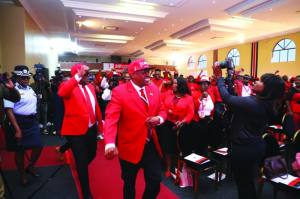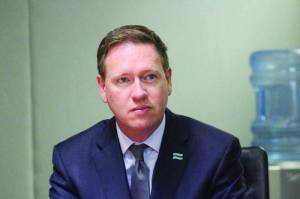President Mokgweetsi Masisi’s appointment of former Cabinet minister and one of the Botswana Democratic Party’s (BDP) seasoned political animals, Lephimotswe Boyce Sebetela to the newly created position of Chief of Staff at government enclave has all the hallmarks of a political master stroke.
This is purely a undisguised political decision intended to serve a political cause. If achieving political ends is everything to the President, then he is worthy of full credit for his accurate reading of the current political tempo. The party is under siege.
Clearly, it requires no rocket science for anyone to realise that the mighty titanic is on the brink of sinking and it is well in order for the President to respond in the manner he did to rescue the situation.
True to the BDP’s, time tested traditions and modus operandi, Masisi, just like his predecessors, sought refuge, cover and justification from an ancient, archaic and fundamentally flawed Constitution.
At the height of electioneering in 2019 season, one of the President’s electoral promises was a review of the national Constitution. One of the glaring loopholes of the Constitution is that it confers enormous and extensive powers on the Executive to the point of emasculating and rendering ineffective other arms of government such as Parliament.
On the basis of promises made, the BDP got a fresh mandate but since assuming power two years back, the party is yet to demonstrate political will to put on track the Constitutional review process. Now, the show goes on as usual.
True to character, the BDP is at it again, fully exploiting the Constitution to hand pick and deploy party cadres to marshall and champion political errands at the expense of the taxpayer.
Thanks to section 112 of the Constitution, Sebetela after over 10 years in the wilderness has returned to government with a bang, albeit as a public servant. While not taking anything away from him, his appointment without due regard for rules and procedures governing recruitment in the public service, clearly raises eyebrows. Therefore, the appointment cannot be allowed to pass unchallenged and without scrutiny.
To place everything into perspective, it could benefit the reader to be walked down the memory lane. The stakes were high in 2019. The BDP entered the 2019 general election season limping and licking its wounds inflicted by the opposition coalition Umbrella for Democratic Change (UDC).
For the first time the BDP’s 50-year uninterrupted rule nearly got disrupted. When approaching the 2019 general election, the BDP was fully conscious and even more fearful of a repeat of the 2014 opposition feat.
To compound matters, the UDC had managed to get the Botswana Congress Party on board.
Given the situation, the possibility of regime change was looming large. The BDP faced the stark reality that it was no longer invincible. Besides this, there was no former president Ian Khama magic as the Khama brothers had decamped from the BDP to establish their own political formation, Botswana Patriotic Front which forged a working relationship with the opposition.
In the absence of the Khama magic, the BDP fortunes fell in the hands of President Masisi, a political demagogue in his own right, schooled in the art of rhetoric. Under the tutelage of Masisi, the BDP ran a campaign based on propaganda and making extravagant promises that were good music to the electorate but with benefit of hindsight difficult to attain.
The commitment to Constitutional reform appears to be one of the promises made in the heat of the moment, but it seems the party continues to relish the benefits accruing from maintenance of the status quo.
And it is business as usual and party activists like Sebetela, Dr. Comma Serema, Dorcas Makgato, Kitso Mokaila and God knows who is next to continue to benefit from an outdated system allowing political affiliation to assume precedence over meritocracy.
The much talked about transformation agenda remains pure rhetoric and the less said about it the better. So, we are back to where we were 50 years. The more things try to change the more they remain pretty much the same. The BDP is not about to abandon its culture of giving its party activists a new lease of life.
The appointment of Sebetela into the post of Chief of Staff is declaration of a vote of no confidence in the existing crop of leaders in the public service. The President could be inadvertently saying there is no depth knowledge in the public service.
If indeed there is no depth in the public service, the President cannot exonerate himself from any blame. Since assuming the reigns of power he had purged a number of veteran civil servants, which deprived the public service institutional memory and experience needed in the management of public affairs.
The list of causalities is long which includes Carter Morupisi, Ruth Maphorisa, Solomon Sekwakwa to name a few. By saying this, one is not suggesting that these officers are indispensable but the motive behind their removal appeared to have been bordering on political expediency rather than performance. It is believed that some were suspected to have remained loyal to the former president Khama. Yes, the public service could be experiencing a drought of leadership occasioned by the sudden weeding out of experienced public officers in favour of loyalists.
Sebetela is coming into the picture to fill the void deliberately created by decisions motivated by political expediency on the part of the political leadership.
Meanwhile, it is interesting to note that a press release from the Office the President states one of the duties of the Chief of Staff is alignment of government machinery and political interest of the government of the day.
One cannot resist the temptation to ask whether government is now accusing the public service of some political sabotage? Is the public service no longer trustworthy resulting in someone being drawn from outside for purposes of panel beating government to dovetail with the political agenda of the ruling party?
Elsewhere, the African National Congress in South Africa has made no secret of its position on the same matter as the party deploys party cadres to drive the agenda of the movement. And it remains to be seen whether Botswana is moving in the same direction.
In the new appointment, the hidden or unwritten agenda is that Sebetela, a northerner, could have been appointed to appease people in the northern hemisphere.
Make no mistake, the BDP fared badly especially in the Central District losing for the first time three Serowe constituencies, two in Mahalapye and one in Tswapong. Therefore, Sebetela could be deployed strategically to revive the fortunes of the BDP in the north through the appointment.
As the holder of position of Chief of Staff he reports directly to the appointing authority, being the President and indirectly to the Permanent Secretary to the President (PSP). Between the PSP, who is the head of the civil service, and Chief of staff it is no longer clear who is the boss.
Through the setup, two officers, the PSP and the Chief of Staff will be vying for the attention and ears of the President. The creation of this post is most likely to trigger off turf wars, which may further weaken the civil service. Already in the war effort against COVID-19 the country is witnessing some cold war between the Presidential Task Force and the Ministry of Health and wellness, a phenomenon which could be undermining the country’s response to the pandemic.
Despite that, the creation of top positions wielding too much power in the Office of President is not without precedent. During his tenure, former president Festus Mogae appointed advocate Sidney Pilane to then newly created position of Special Adviser to the President.
The position resulted in ugly turf wars between the new office and the Attorney General’s office. For the first time in history, the Attorney General found themselves at loggerheads with government in Court due to somewhat perceived overbearing conduct of the Special Advisor.
Having probably learnt good lessons the bitter way when former president Khama took office he dispensed with the office of the Special Adviser to the President. Maybe President Masisi should have drawn some valuable lessons from the experience of Mogae before creating a parallel structure.
Now, with the creation of the post of Chief of Staff this could mean the birth of two centres of power competing for supremacy. Or will they co-exist in the spirit of mutual respect and survival?







